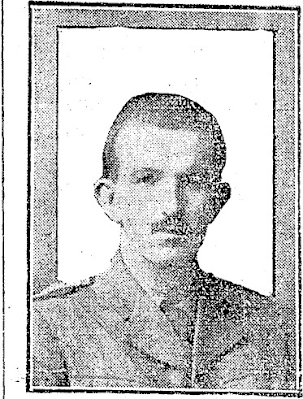The Otago Daily Times states that Mrs T. Nisbet yesterday received a private cablegram from Heliopolis, stating that her son, Lieutenant Nisbet, who was reported wounded in the Dardanelles fight, was wounded in the hand and arm, and that he is progressing satisfactorily. -Oamaru Mail, 11/5/1915.
ROLL OF HONOUR
Careers of the Fallen
LIEUTENANT T. H. NISBET.
Lieutenant Thomas Holmes Nisbet, reported killed, was formerly a subaltern in A Company, 4th (Otago) Regiment, and on joining the Otago Infantry Battalion was posted to the 10th (North Otago) Company. He was an ex-Waitaki High School boy, and was studying law at Otago University when he enlisted. He is a son of the late Rev. D. Nisbet, of First Church, and wae a prominent member of the University Football Club. Lieutenant Nisbet was recently mentioned in dispatches. -Auckland Star, 13/8/1915.
LIEUTENANT T. H. NISBET.
A correspondent writes as follows: If you can find space in your columns for the enclosed little personal notice of the late Lieutenant T. H. Nisbet I feel sure your courtesy will be gratefully appreciated by a number of his friends. No man answered the call more promptly nor with a fuller appreciation of his responsibilities than did Thomas Holmes Nisbet, now reported killed in action at the Dardanelles, where he had already suffered one wound and had also been mentioned in despatches. For one so young— only 23 this month — Nisbet was an interested student of Imperial affairs, and as a Territorial officer was noted on all hands for his keenness. But it is of the man himself I wish to speak. Tall, erect, broad-shouldered, and of splendid physique, with a fine, handsome face set off by thick black hair, Nisbet made a conspicuous figure in any company; while his character, marked by a happy combination of earnestness and buoyant spirits, attracted a wide circle of friends and admirers. His genial smile was proverbial. At capping carnivals he was a host in himself. His gifts were of a varied order. Intellectually he had the talent to succeed in any profession, while as an athlete he had proved himself a worthy opponent in football, boxing, and rowing. Whatever he was doing at the moment, into that he put his whole heart and soul and sinew, and whatever duty he was called upon to perform, whether reckless bravery or patient endurance was required, we may he certain that he acted in a manner that will he an inspiration to his companions till the long days of trial be over. Somewhere out on that distant hillside he is lying, while we, thinking of his untimely death, remember with gratitude our past friendship, and our hearts beat faster as we repeat the grand old words: “Dulce et decorum est pro patria. mori.” Such is the death he would gladly have chosen, and we may be sure he met it bravely. Though he is gone from our sight, and another shall not take his place in our hearts, sorrow for our loss must give way to pride in our departed friend. Let us write his epitaph: “He answered the call.’’ -Evening Star, 13/8/1915.
"IT WAS NOT THE FIGHTING."
HARDSHIPS TELL ON TROOPS.
"It was not the fightng, it was the hardship" said a thin-faced soldier on arrival at Dunedin, and who is marked down for a hospital case. He left a wife and one child in Dunedin to go with the main force. "I had to be in it," he added, "and after many weeks of fighting had to knock under to disease." This man has no hesitation in naming the finest officer he served with on the peninsula — Major Statham — and he has also great praise for Lieutenant Nisbet. -Poverty Bay Herald, 29/12/1915.


No comments:
Post a Comment